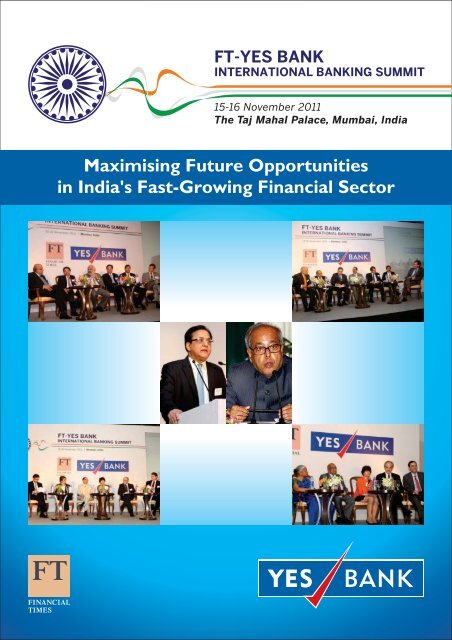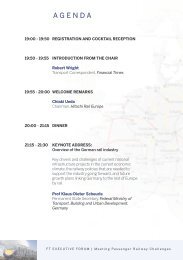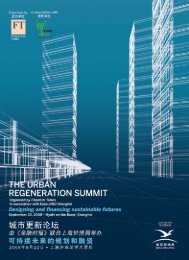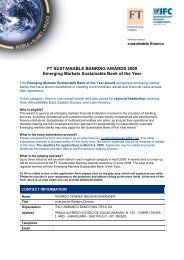2011 Summary can be downloaded HERE - FT Live
2011 Summary can be downloaded HERE - FT Live
2011 Summary can be downloaded HERE - FT Live
You also want an ePaper? Increase the reach of your titles
YUMPU automatically turns print PDFs into web optimized ePapers that Google loves.
Maximising Future Opportunities<br />
in India's Fast-Growing Financial Sector
THANK YOU for your support<br />
Platinum & Founding Sponsors<br />
Gold Sponsors Silver Sponsors<br />
Organizers<br />
CWCNSL
<strong>FT</strong>-YES BANK International Banking Summit<br />
15-16 Novem<strong>be</strong>r , <strong>2011</strong>, The Taj Mahal Palace, Mumbai, India<br />
YES BANK, India's new age private sector Bank and Financial Times,<br />
world's leading business<br />
newspaper, instituted the first-of-its-kind <strong>FT</strong>-YES BANK International Banking Summit,<br />
a pathbreaking<br />
conference focused on Maximising Future Opportunities in India's Fast-Growing<br />
Financial Sector.<br />
Although India's financial industry remains dominated by the public sector, the num<strong>be</strong>r of domestic<br />
private banks has grown rapidly, with many of them venturing overseas, and many foreign financial<br />
institutions building up their share of the Indian market. Increasing integration with the global<br />
financial architecture, however, has brought fresh challenges, both regulatory and competitive.<br />
This unique platform was conceived with the objective of analyzing the latest global and domestic<br />
challenges facing India's financial industry, and exploring how they <strong>can</strong> <strong>be</strong> turned into opportunities<br />
for local and foreign institutions in one of the world's fastest growing economies.<br />
The exclusive Summit received an outstanding response, and witnessed the presence of Government<br />
Leaders & Policy makers, Regulators, Indian and International Bankers, Corporate and Thought<br />
Leaders from across the world. The discussions were extremely interesting and insightful with<br />
praticipation from over 40 renowned speakers and more than 1000 distinguished delegates.<br />
The<br />
interactive session with Shri Pranab Mukherjee, Hon'ble Finance Minister, Government of India,<br />
discussion with international regulators and the interactive Q & A sessions were all truly well<br />
received.<br />
Going forward, we are certain that this annual Summit will provide an excellent platform for<br />
participants to network and learn from the insights, experiences and <strong>be</strong>st practices of leaders and<br />
experts from across the world. We look forward to your continued support towards this signifi<strong>can</strong>t<br />
initiative.<br />
Yours sincerely,<br />
John Ridding<br />
CEO<br />
Rana Kapoor<br />
Summit Chairman &<br />
Founder, Managing Director and CEO<br />
1
2<br />
Highlights<br />
A world-class platform taking India and Indian banking to the world<br />
Exclusive interactive discussion with Shri Pranab Mukherjee, Hon’ble Finance<br />
Minister, Government of India<br />
Participation of over 1,000 distinguished delegates from across the world<br />
Participation from Key Leaders across Government, Indian & International<br />
Regulators, Banks & Corporations and Opinion Leaders<br />
Over 40 world-renowned speakers from India and Overseas<br />
Address by Shri Pranab Mukherjee<br />
Honourable Finance Minister, Government of India<br />
DR. RANA RANA KAPOOR KAPOOR<br />
Hotel Hotel Taj Mahal Mahal Palace, Palace, Mumbai Mumbai<br />
SH. PRANAB MUKHERJEE<br />
Dr. Rana Kapoor,<br />
Summit Chairman, and Founder, Managing Director & CEO,<br />
YES BANK moderating an exclusive interactive discussion with<br />
Shri Pranab Mukherjee,<br />
Honourable Finance Minister, Government of India<br />
discussing contemporary issues of relevance in India’s growing financial sector
Kaushik Basu<br />
Chief Economic Advisor<br />
Ministry of Finance,<br />
Government of India<br />
K C Chakrabarty<br />
Deputy Governor<br />
Reserve Bank of India<br />
Usha Thorat<br />
Director, Centre for Advanced<br />
Financial Research and<br />
Learning (CAFRAL), India<br />
Keynote Speakers<br />
Jyrki Koskelo<br />
Special Advisor to<br />
Executive Vice-President<br />
and CEO, IFC<br />
Johnny Akerholm,<br />
CEO, Nordic Investment Bank<br />
Muhammad Ali,<br />
Chairman, BRAC Bank<br />
Abdulla Mohammed Al Awar,<br />
CEO, DIFC Authority<br />
Robin Banerjee,<br />
Chief Financial Officer, Suzlon Group<br />
A.K. Bansal,<br />
Executive Director, Indian Overseas Bank<br />
Saurabh Bhat,<br />
President and Managing Director, Development &<br />
Sustainable Banking, YES BANK<br />
Sonjoy Chatterjee,<br />
Chairman, Goldman Sachs India<br />
Prabhu Chawla,<br />
Editor-in-Chief, New Indian Express<br />
Stuart Davis,<br />
CEO, HSBC India<br />
Ajay Desai,<br />
Chief Financial Inclusion Officer, YES BANK<br />
Michael Jude Fernandes,<br />
Executive Director, Investments,<br />
Khazanah Nasional<br />
Akhil Gupta,<br />
Chairman, Blackstone India<br />
Partha Iyengar,<br />
Vice President and Distinguished Analyst, Gartner<br />
Umesh Jain,<br />
Chief Information Officer, YES BANK<br />
Manish Khera,<br />
CEO, FINO<br />
Matthew Kirkby,<br />
Head-Global Banking, Asia Pacific, Global Head<br />
of Corporate Finance, RBS<br />
Suresh Kumar,<br />
CEO, Emirates Financial Services<br />
Subir Gokarn<br />
Deputy Governor<br />
Reserve Bank of India<br />
John Lipsky<br />
Special Advisor to the<br />
Managing Director<br />
International Monetary Fund<br />
Other Valued Speakers<br />
Lord Meghnad Desai,<br />
Emeritus Professor, London<br />
School of Economics and<br />
Political Science<br />
Jaime Caruana<br />
General Manager, Bank<br />
for International<br />
Settlements<br />
Y.V. Reddy<br />
Former Governor<br />
Reserve Bank of India<br />
Heidi Miller,<br />
President of International, JP Morgan Chase<br />
Rajat Monga,<br />
Group President & Chief Financial Officer, YES BANK<br />
Thierry Monjauze,<br />
Head of European Operations, Harris<br />
Williams & Co.<br />
M.V. Nair,<br />
Chairman and Managing Director, Union Bank of India<br />
M. Narendra,<br />
Chairman & Managing Director, Indian Overseas<br />
Bank<br />
R. Jaideep Poondir,<br />
Vice President, Delivery Head - Banking and<br />
Financial Services, Cognizant<br />
C.N. Ram,<br />
Co-Founder, Rural Shores, and CIO, Essar Group<br />
Shubhada Rao,<br />
President and Chief Economist, YES BANK<br />
Vaughn Richtor,<br />
CEO, ING Banking Asia<br />
Aditya Sanghi,<br />
President and Senior Managing Director,<br />
Investment Banking, YES BANK<br />
R. Seetharaman,<br />
CEO, Doha Bank<br />
Sunil Soni,<br />
Principal Secretary, Finance (Reforms), Government<br />
of Maharashtra<br />
Anuj Vaid,<br />
General Manager and BFSI Vertical Head, Wipro<br />
Infotech<br />
Etienne Viard,<br />
CEO, PROPARCO<br />
3
Welcome Remarks<br />
The idea of having an International Banking Summit<br />
has <strong>be</strong>en conceived by the team at YES BANK and<br />
Rana Kapoor<br />
Summit Chairman &<br />
Founder, Managing Director and CEO<br />
complemented brilliantly by Financial Times. This is the<br />
inaugural session, and I would like to welcome all the<br />
dignitaries and delegates for this first-of-its-kind global<br />
banking Summit in India. While we are facing global<br />
uncertainties, we have <strong>be</strong>en able to mobilize over 40 eminent<br />
speakers and over 1000 delegates from all parts of the world<br />
for this Summit in India. India, at this time of its life cycle, is<br />
presented with a unique opportunity in adversity driven by its<br />
growing economy, favourable demographics and progressive<br />
YES BANK<br />
reforms <strong>be</strong>ing undertaken by the Government. The Indian<br />
financial sector has undergone signifi<strong>can</strong>t transformation and<br />
global integration, under the able guidance of the Reserve Bank of India (RBI). The second generation reforms,<br />
including the recent deregulation of the savings rate, opening of branch licensing, etc. are game changers which<br />
will facilitate the shift from lazy banking to dynamic banking. The sessions over the next two days will provide a<br />
unique platform for the international financial sector, to build mutually symbiotic models through strategic<br />
alliances and shared models.<br />
The discussion comes at an important time,<br />
particularly considering the uncertain global economic<br />
environment. Back in India, the economy has shown resilience<br />
during the crisis period and shown good growth. While the<br />
Indian financial system was appreciated for its prudence, it<br />
also needs to <strong>be</strong> equally expansive and inventive. There is a lot<br />
to learn from the Indian banks including low cost innovation<br />
considering the size and diversity of the nation. Over the next<br />
two days we will hear leaders from the global financial<br />
industry on all these aspects. I would like to thank our partner<br />
YES BANK and Dr. Rana Kapoor, for his support towards the<br />
Summit.<br />
4<br />
James Lamont<br />
South Asia Bureau Chief<br />
Financial Times
Commentary by Dr. Rana Kapoor<br />
Founder, Managing Director & CEO, YES BANK<br />
Taking Indian Banking to the World<br />
Encouraged by the highly positive feedback from all<br />
stakeholders and encouragement from Hon'ble Finance Minister,<br />
st<br />
Shri Pranab Mukherjee, we have, today, inaugurated the 1 <strong>FT</strong>-YES<br />
BANK International Banking Summit in Mumbai - the financial<br />
capital of India.<br />
It gives me immense pleasure to advise you that the Summit<br />
received an overwhelming response from world over.<br />
As the Summit Chairman, I would like to personally thank all the<br />
dignitaries from the Government, Corporate and Thought Leaders<br />
for their active participation and contribution to the first-ever <strong>FT</strong>-YES BANK International Banking Summit in<br />
Mumbai, which was by all measures a resounding success. The spirit, energy and enthusiasm throughout the<br />
sessions was remarkable, and provided a renewed sense of optimism and a clear set of recommendations for<br />
addressing some of India's most pressing financial sector challenges. I also take this opportunity to thank all our<br />
partners as it is their <strong>be</strong>lief and support without which this event would not have <strong>be</strong>en such a great success.<br />
One of our key objectives at this Summit was to create a world-class platform for Indian Banking amongst<br />
International audiences. We have, through this forum, tried to bring together the key decision-makers to assess the<br />
latest global and domestic challenges facing India's financial industry and explore how they <strong>can</strong> <strong>be</strong> turned into<br />
opportunities for local and foreign institutions in one of the world's fastest growing economies.<br />
As discussed during the Summit, the fundamental growth aspects of Indian economy remain strong, and the<br />
financial sector has to maintain its growth pace with the economy. While prudent regulatory oversight from RBI<br />
over the last decade has successfully steered Indian banks towards robust health and performance, the financial<br />
sector now looks forward to a decade that is full of opportunities.<br />
As the financial sector Maximises the Future Opportunities in India's Fast-Growing Financial Sector, it is also<br />
imperative for the financial sector to work towards the sustainable and balanced growth of the economy. I <strong>be</strong>lieve<br />
that product innovation with prudential norms will <strong>be</strong> key, as the financial sector fuels the growth of the real<br />
economic sectors of the country.<br />
“One of our key objectives at<br />
this Summit was to create a<br />
world-class platform for Indian<br />
Banking amongst International<br />
audiences”<br />
This Summit has <strong>be</strong>en conceived as an annual event, and we do<br />
hope to take this event to not only <strong>be</strong>come one of the foremost<br />
Summits in India but a renowned one internationally, as far as the<br />
Indian banking sector is concerned. The quality of delegates,<br />
world-class speakers and extensive visibility created both in India<br />
and globally has <strong>be</strong>en tremendous, and we hope to keep raising<br />
the <strong>be</strong>nchmark each year.<br />
5
Exclusive Interactive Discussion with the Hon’ble Finance Minister of India<br />
6<br />
Shri Pranab Mukherjee<br />
Hon’ble Finance Minister<br />
Government of India<br />
I am very happy to join you all at the first Financial<br />
Times-YES BANK International Banking Summit, even<br />
though it is only in a virtual sense. Let me <strong>be</strong>gin by<br />
congratulating Dr. Rana Kapoor and his partners for<br />
organizing this Summit and bringing together distinguished<br />
panel of bankers, financial experts, investors, policy makers<br />
and regulators to deli<strong>be</strong>rate on contemporary issues of<br />
relevance to India's growing financial sector. I am happy to<br />
see the themes such as banking reforms, cross-border<br />
strategic alliances and rural development and financial<br />
inclusion that you have addressed in your discussion over the<br />
two days of the Summit.<br />
The Indian financial sector has seen signifi<strong>can</strong>t<br />
transformation, rapid growth and global integration over the<br />
last decade. The banking sector has shown great resilience in the course of the global financial crisis and its<br />
continuing aftermath. The fact that India has not gone through any major financial turbulence, as a result of the<br />
earlier phase of financial deregulation is a testimony to<br />
our consistent view that reforms in global standards<br />
have to <strong>be</strong> adapted to local conditions.<br />
The economic reforms initiated during the early 1990s<br />
have borne good results for the Indian economy. The<br />
economy has moved on to a higher growth trajectory,<br />
with improved fundamentals and resilience to external<br />
and domestic shocks.<br />
The basic objective of the financial sector reforms has<br />
<strong>be</strong>en to promote a diversified, efficient and competitive<br />
financial system, with the ultimate objective of<br />
improving the allocative efficiency of resources. This has<br />
“Congratulations to Dr. Rana Kapoor<br />
and his partners for organizing this<br />
Summit and bringing together<br />
distinguished panel of bankers,<br />
financial experts, investors, policy<br />
makers and regulators to deli<strong>be</strong>rate on<br />
contemporary issues of relevance in<br />
India's growing financial sector”<br />
<strong>be</strong>en sought by ensuring greater operational flexibility, improved financial viability and strengthening of<br />
regulatory institutions. The reforms were carefully sequenced in respect of policy instruments and in terms of<br />
specific objectives that had to <strong>be</strong> addressed.<br />
We have taken steps in recent months, to take this process forward. Legislations have <strong>be</strong>en introduced in the<br />
Parliament to address some issues in the financial sector including insurance, banking, and pension sectors. We<br />
have set up Financial Sector Legislative Reforms Commission to review financial sector laws with the objective of<br />
bringing them in tune with current requirements and global <strong>be</strong>st practices. An apex-level Financial Stability and<br />
Development Council has <strong>be</strong>en established and is functioning to strengthen and institutionalize the mechanisms<br />
for maintaining financial stability and improving the inter-regulatory coordination.<br />
In the post-crisis period, financial stability has <strong>be</strong>come an integral part of policy discussions and macroeconomic
objectives globally. A sound and resilient banking sector,<br />
well-functioning financial markets, robust liquidity<br />
management and payment and settlement infrastructure<br />
are the pre-requisites for financial stability.<br />
The second generation reforms currently underway have<br />
<strong>be</strong>en built on the reforms over the past two decades. It<br />
includes the recent deregulation of the savings interest<br />
rate, discussions on mode of presence of foreign banks<br />
and the process to give additional banking licenses to<br />
private sector players. These steps seek the<br />
transformation of the Indian banking sector into a reasonably strong, diversified and resilient system with<br />
signifi<strong>can</strong>t opportunities for growth.<br />
The evolving circumstances present several challenges in the short to medium-term. We need to sustain the<br />
momentum of expansion in domestic banking services, even as global growth is weak and is laden with<br />
uncertainties. The possibility of systemic impact of sovereign debt crisis in Euro-zone countries on international<br />
financial markets is a looming reality. We also need to overcome domestic concerns including those related to<br />
capitalization issues of the public sector banks and the threat posed by their growing non-performing assets.<br />
The aim of Basel III is to improve the banking sector's ability to absorb shocks arising from financial and economic<br />
stress, thus reducing the risk of spill-over from the financial sector to the real economy. Basel III also seeks to<br />
strengthen micro prudential regulations which will help raise the resilience of individual banking institutions in<br />
periods of stress. Sufficient cushion is available with Indian banks to absorb the enhancement in the equity and Tier I<br />
capital requirements as per Basel III. Following my Budget Speech <strong>2011</strong>-12, the Government is committed to enable<br />
Public Sector Banks to maintain a minimum Tier-I CRAR of 8 per cent.<br />
As banking <strong>be</strong>comes more sophisticated in a complex globalised market, there is a need for improving the skill and<br />
knowledge set of bank employees. There has to <strong>be</strong> a constant effort to understand the functioning of the financial<br />
markets, the <strong>be</strong>st practices that underpin the creation of new financial products and the related oversight issues, so as<br />
to promote financial stability for sustained growth.<br />
As part of the efforts to ensure convergence of the Indian Accounting Standards (IASs) with the International<br />
"Financial Reporting Standards (IFRSs), a roadmap for convergence of IAS with IFRS for banking companies and<br />
non-banking financial companies (NBFCs) has <strong>be</strong>en finalized.<br />
Financial inclusion is an important development priority of the Government. Only about 38 per cent of Scheduled<br />
Commercial Bank branches are in rural areas and just<br />
about 40 per cent of country's population has bank<br />
“A sound and resilient banking sector,<br />
well-functioning financial markets,<br />
robust liquidity management and<br />
payment and settlement infrastructure<br />
are the pre-requisites for financial<br />
stability”<br />
“Entry of new banks, both Indian and<br />
foreign, would increase competition in<br />
the banking sector with attendant<br />
<strong>be</strong>nefits in the form of improved<br />
efficiency in banking intermediation and<br />
encouraging product innovation and<br />
development”<br />
accounts. We are presently working towards covering<br />
around 73,000 villages with a population of 2000 or more<br />
by March 2012 under our financial inclusion initiative. As<br />
of Septem<strong>be</strong>r <strong>2011</strong> we have already covered 40,000<br />
villages.<br />
Up-scaling of financial inclusion efforts is essential for<br />
banks, as it embodies the potential for augmenting<br />
7
growth prospects in terms of enhancing bank savings and financial deepening. At the same time it would contribute<br />
to a more inclusive development of the economy.<br />
Expansion in banking services is a critical ingredient for sustaining high economic growth. Entry of new banks, both<br />
Indian and foreign, would increase competition in the banking sector with attendant <strong>be</strong>nefits in the form of improved<br />
efficiency in banking intermediation and encouraging product innovation and development. These in turn, would<br />
contribute to <strong>be</strong>tter growth prospects for the banks and the economy. Indian Banking has to <strong>be</strong> receptive to and<br />
proactive in harnessing this opportunity.<br />
Let me conclude by thanking the Financial Times and YES BANK for giving me this opportunity to share some of my<br />
views with distinguished participants who have given me a patient hearing. I hope your deli<strong>be</strong>rations at the Summit<br />
have <strong>be</strong>en fruitful. I wish you all the very <strong>be</strong>st in your endeavours.<br />
8
Summit Chairs<br />
Rana Kapoor is the Founder, Managing Director and CEO<br />
of YES BANK. A professional entrepreneur, Dr. Kapoor<br />
since 2003 has progressively established YES BANK as a<br />
high quality, state-of-the-art private Indian bank with a<br />
stated vision of “Building the Best Quality Bank of the World<br />
in India” by 2015. Under his leadership, YES BANK has<br />
evolved into a Professionals' Bank of India, adopting global<br />
<strong>be</strong>st practices and the highest standards of service quality<br />
and operational excellence.<br />
Rana Kapoor Prior to establishing YES BANK, Dr. Kapoor was CEO and<br />
Summit Chairman &<br />
Managing Director, and main Managing Partner of Rabo<br />
Founder, Managing Director and CEO<br />
YES BANK<br />
India Finance Pvt. Ltd. (RIF), responsible for all its business<br />
activities (Corporate Finance and Investment Banking). He<br />
successfully spearheaded Rabo India Finance as a foreign<br />
joint-venture financial-services organization in partnership with Rabobank (AAA-rated) in India, and thereafter<br />
sold his shareholdings to Rabobank, Netherlands, in early 2003, after building RIF as a Professional Entrepreneur<br />
(1998-2003).<br />
Prior to starting Rabo India Finance in 1998, Dr. Kapoor was General Manager and Country Head of ANZ<br />
Grindlays' Investment Bank from 1996 to 1998. Before that, he spent 15 years at Bank of America (1980-1995), where<br />
he last headed the bank's wholesale banking businesses. In 1990, he was presented the Eagle Pin by the chairman of<br />
Bank of America, the bank's highest professional recognition for consistent performance excellence.<br />
Dr. Kapoor recently received the Entrepreneur of the Year award at the Asia Pacific Entrepreneurship Awards<br />
<strong>2011</strong>. In March 2010, he was awarded the Entrepreneurial Banker of the Decade (2001-2010) by the Bombay<br />
Management Association, and in Novem<strong>be</strong>r 2010, he was ranked the 2nd Most Valuable Indian CEO of the Year<br />
(Mid-sized category) by Business World magazine. His other honours include a Doctorate in Science (Honoris<br />
Causa) from G.B. Pant University of Agriculture & Technology towards his enormous contribution to the Indian<br />
Food and Agriculture sector, and the Distinguished Entrepreneurship Award at the PHD Cham<strong>be</strong>r Awards for<br />
Excellence 2007. Dr. Kapoor received the President's Medal from Rutgers University in the US, where he earned an<br />
MBA degree in 1980. He holds a Bachelor's degree in Economics from the University of Delhi in 1977.<br />
9
Henny Sender joined the Financial Times in 2007. She was<br />
previously the Wall Street Journal's Senior Special Writer for<br />
the Money & Investing section and covered private equity<br />
and hedge funds. Before joining the Journal, Ms. Sender<br />
worked in Hong Kong for nearly 10 years and covered<br />
regional finance for the Wall Street Journal Asia and the Far<br />
Eastern Economic Review. Prior to that, she was in Tokyo for<br />
five years for Institutional Investor. Ms. Sender was part of a<br />
team at the Journal that won a Loeb award for coverage of the<br />
meltdown of Amaranth, a hedge fund. Her work on the<br />
overseas Chinese received a citation from the Overseas Press<br />
Club and she was a finalist for the National Magazine<br />
Awards. Her book on India, The Kashmiri Pandits,<br />
was<br />
published by Oxford University Press. Ms. Sender holds an<br />
MS from the Columbia University School of Journalism. She<br />
is a mem<strong>be</strong>r of the Council on Foreign Relations.<br />
10<br />
James Lamont<br />
South Asia Bureau Chief<br />
Financial Times<br />
James Lamont was appointed South Asia Bureau Chief for<br />
the Financial Times in 2008, having spent four years as the<br />
London-based World News Editor. Prior to this, he was the<br />
<strong>FT</strong> Weekend News Editor and <strong>be</strong>fore that the Johannesburgbased<br />
Southern Africa Correspondent. Before joining the<br />
Financial Times in 2001, Mr. Lamont was Editor of Business<br />
Report, South Africa's largest financial daily. He was Deputy<br />
Editor of the Middle East Times in Cairo. He also reported on<br />
oil and gas in the region for the OPEC news agency. Mr.<br />
Lamont started his career in journalism writing for a UKbased<br />
consumer magazine. He completed his first degree at<br />
the University of York and did a postgraduate course in<br />
Southern Africa studies.<br />
Henny Sender<br />
Chief Correspondent<br />
International Finance, Financial Times
Day One, Novem<strong>be</strong>r 15, <strong>2011</strong><br />
The Global Economic Outlook<br />
Session Overview<br />
Opportunities for India Banks – New Models of Growth<br />
Sustaining Growth Through Banking Reforms<br />
Cross-Border Strategic Alliances as a New Order of Business<br />
Day Two, Novem<strong>be</strong>r 16, <strong>2011</strong><br />
Rural Development and Financial Inclusion – A Policy & Business Priority<br />
Creative Technology for Financial Efficiency and Superior Customer Experience<br />
Opportunities in Sustainable Finance<br />
Keynote Session with International Regulators<br />
11
The Global Economic Outlook<br />
12<br />
Lord Meghnad Desai<br />
Emeritus Professor, London School of<br />
Economics and Political Science<br />
While 1992-2007 was a long boom period for the world economy, post 2007 the economies are reeling under the<br />
pressure, as we move into the fourth year of slow down<br />
Previous recessionary cycles indicate that recessions typically last for 8-10 years, and as per the current trends,<br />
the developed economies will not <strong>be</strong> able to catch up <strong>be</strong>fore 2015<br />
Although, a profound transformation is <strong>be</strong>ing witnessed in the global economy with shift in tectonic plates,<br />
the centre of economic gravity is shifting from mid-Atlantic to Central Asia, and now further moving<br />
Eastwards<br />
During the growth period, the emerging economies over-saved and actually funded the consumption of the<br />
under-saving developed economies. This is not sustainable anymore<br />
Savings from the emerging economies need to <strong>be</strong> deployed efficiently and given limited opportunities in the<br />
developed economies, there is a need to facilitate trade among intra emerging economies as the next lever of<br />
growth<br />
On the current sovereign debt crisis: no sovereign debt is actually sovereign, and there are no risk free assets<br />
now. This <strong>can</strong> only work in a closed economy. Internationally, the monetary systems need to <strong>be</strong> revamped and<br />
alternate means of payments and store of value should also <strong>be</strong> looked at
Opportunities for India Banks – New Models of Growth<br />
After the crisis, banks face a world of increased regulation, complexity, risk and capital requirements. Profitability<br />
has <strong>be</strong>en further hurt by the drying up of lucrative sources of fee-based income. It has <strong>be</strong>come essential to explore<br />
new models of growth. In the new global economic order, India-related trade and investment opportunities are<br />
projected to increase multi-fold – both inbound & outbound. The domestic demand-driven economy is also<br />
creating unprecedented need for consumer banking solutions at all levels of the income pyramid. How should the<br />
Indian banking sector – public sector undertaking banks (PSUs), private banks and multinational banks – respond<br />
to these opportunities across trade, investments and payments? What will <strong>be</strong> the impact of the likely ballooning of<br />
trade <strong>be</strong>tween emerging markets, and how will that affect developed economies and MNC banks in particular?<br />
Keynote Speaker<br />
Both finance capital and human capital are going to <strong>be</strong> stretched<br />
in the coming times. Also, with the BASEL III norms <strong>be</strong>ing implemented<br />
by banks, capital will further get stretched. However, there will <strong>be</strong><br />
numerous opportunities for the Indian banking sector with the evolving<br />
income pyramid and inherent demographic advantage. The challenge<br />
here would <strong>be</strong> how to address the diversified needs of the consumers<br />
through new and innovative models of growth<br />
Panel Discussion<br />
Dr. Subir Gokarn<br />
Deputy Governor, Reserve Bank of India<br />
Seated L to R: Suresh Kumar, CEO, Emirates Financial Services; M.V. Nair, CMD, Union Bank of India; Subir Gokarn, Deputy Governor,<br />
Reserve Bank of India; Rana Kapoor, Founder, Managing Director & CEO, YES BANK; Sonjoy Chatterjee, Chairman, Goldman Sachs India;<br />
James Lamont, South Asia Bureau Chief, Financial Times<br />
13
Session Takeaways<br />
14<br />
There was a convergent opinion of the panel on the opportunities and new sustainable models of growth:<br />
<br />
<br />
<br />
<br />
<br />
SME and MSME Financing – They form the backbone of any economy, and in the context of India, there<br />
is a need for structured credit products designed specifically to address the Indian market<br />
Infrastructure Growth – Investment in the infrastructure sector is expected to go up to a trillion dollars<br />
over the 12th five year plan, and the key here for financial institutions will <strong>be</strong> to devise innovative<br />
financing models and manage Asset-Liability Management (ALM) risks on the balance sheet<br />
Trade Financing – While India’s share in global trade has increased, the share of Indian banks in trade<br />
finance has not increased correspondingly. Going forward, this will <strong>be</strong> a focus area for Indian banks<br />
Banking the Unbanked – Brick and mortar banking has not <strong>be</strong>en able to create adequate banking<br />
penetration as it is expensive and inefficient to target population in the lower income groups.<br />
Technology will act as a key enabler to achieve cost efficiencies, and accelerate scaling up of new<br />
business models. This, supplemented by major initiatives such as the implementation of the Unique<br />
Identification (UID) project will signifi<strong>can</strong>tly reduce cost of acquisition for banks, and help achieve<br />
financial inclusion objectives<br />
Innovative models that banks will adopt - Transforming cost base to asset light models through<br />
outsourcing, developing cost efficient leaner organizations, forging strategic partnerships/ alliances,<br />
and developing an optimal mix of distribution channels<br />
Following the recent path-breaking reform on Savings Rate Deregulation introduced by the Government of<br />
India, other key game-changers needed are:<br />
<br />
<br />
<br />
Further to deregulation of Tier II to Tier VI licenses, there should <strong>be</strong> calibrated deregulation of Tier I<br />
branch licenses linked to the branches in Tier II to Tier VI<br />
The current PSL obligations could <strong>be</strong> redefined and banks should take it as a socially responsible activity<br />
that is economically viable and commercially feasible<br />
While maintaining the overall safety net, the Cash Reserve Ratio (CRR) and Statutory Liquidity Ratio<br />
(SLR) should <strong>be</strong> managed such that the depositors money is used more efficiently
Sustaining Growth Through Banking Reforms<br />
The Indian economy is expected to grow at over 8% per year over the next decade. To sustain this growth the<br />
financial services sector needs to expand in parallel and act as the engine for development. Deeper and more liquid<br />
capital markets are needed to finance a required US$1 trillion worth of infrastructure spending over the next five<br />
years. The Reserve Bank of India has already suggested that foreign banks could <strong>be</strong> allowed to operate via whollyowned<br />
subsidiaries, rather than headquarter branches, to allow them to offer new financial products and expand<br />
into new markets. What impact will these changes have on competition with domestic banks, particularly on loans<br />
and offerings such as insurance and capital market instruments? What level of li<strong>be</strong>ralisation, and across which<br />
sectors, would <strong>be</strong> required to meet the growth targets set out by the government; and what would <strong>be</strong> the impact on<br />
the economy should li<strong>be</strong>ralisation come to a halt? What reforms are required to allow domestic institutions to<br />
facilitate growth hand-in-hand with foreign partners?<br />
Keynote Speaker<br />
A vibrant banking and financial sector is essential for the<br />
growth of the real economy. While currently ~70-75% of Indian banking<br />
is state run, there is a trying need for private banks to take a larger share<br />
of the Indian banking industry. On regulatory reforms, my opinion is<br />
that good regulation is a matter of balance that keeps on evolving and<br />
should <strong>be</strong> designed in a way that keeps the real sector growing and<br />
thriving<br />
Panel Discussion<br />
Dr. Kaushik Basu<br />
Chief Economic Advisor, Ministry<br />
of Finance, Government of India<br />
Seated L to R: Rajat Monga, Group President & CFO, YES BANK; Heidi Miller, President of International, JP Morgan Chase; Kaushik Basu,<br />
Chief Economic Advisory, Ministry of Finance, India; Henny Sender, Chief Correspondent, International Finance, Financial Times; Johnny<br />
Akerholm, CEO, Nordic Investment Bank; Stuart Davis, CEO, HSBC India<br />
15
Session Takeaways<br />
16<br />
There is a huge opportunity cost for lack of reforms. Deregulation of the financial sector should take place at<br />
the right time for India to realize its true potential.<br />
Borrowing costs remain high in India and there is a need for additional capacity creation<br />
Asian papers carry a strong demand globally. If the environment is conducive, there will <strong>be</strong> no dearth of<br />
capital coming into India<br />
Some key reforms required include:<br />
<br />
<br />
<br />
<br />
<br />
<br />
<br />
<br />
Innovative ways of financing infrastructure would <strong>be</strong> required to keep pace with India’s economic<br />
growths<br />
The large investments required for infrastructure development in India would need various foreign<br />
sources of capital as domestic savings alone may not <strong>be</strong> sufficient<br />
Efficient deployment of long term savings such as pension funds that are currently <strong>be</strong>ing managed<br />
defensively<br />
Reforms are required both on the supply side as well as the demand side. Public Private Partnership<br />
(PPP) models that have worked well for the roads sector, should <strong>be</strong> replicated for other infrastructure<br />
sectors as well<br />
Development of the long term bond market<br />
For SMEs, while there is systemic support, capital market reforms such as success of the SME exchange<br />
<strong>can</strong> reduce cost of capital<br />
Further granularity in the credit ratings would <strong>be</strong> required for <strong>be</strong>tter risk assessment by banks<br />
Other sectoral reforms that are currently in the pipeline include Foreign Direct Investment (FDI) in the<br />
retail sector, Goods & Services Tax (GST) etc.<br />
With increasing pressure on healthy capitalization of banks, risk weighted assets are expected to <strong>be</strong> run<br />
down globally<br />
On a specific question related to using interest rate as a tool to fight inflation, Dr. Basu commented “In the<br />
current global scenario where interest rates across various economies are signifi<strong>can</strong>tly different, we <strong>can</strong> look<br />
at other experimental models”
Cross-Border Strategic Alliances as a New Order of Business<br />
Indian companies are increasingly expanding abroad through exports, nearshoring, M&A and other channels. In<br />
parallel, a large num<strong>be</strong>r of global firms are investing in the India growth story <strong>be</strong>yond simple sourcing of goods<br />
and services. Is the banking sector sufficiently geared to support these increasingly complex global aspirations or is<br />
there specific support required from government and regulators to increase competitiveness? With increasing<br />
regulation and protection, what kind of global alliances <strong>can</strong> <strong>be</strong> formed to serve clients <strong>be</strong>tter?<br />
Keynote Speaker<br />
There is an accelerated shift to Emerging markets. The time<br />
taken will <strong>be</strong> a lot sooner than most will realize. Emerging markets are<br />
buying assets, both South-South and South-North. What they<br />
thought would take them 10 years or more to achieve is taking them<br />
only 5 years to accomplish. Even though India has a strong domestic<br />
sector, it is not isolated, do not <strong>be</strong> fooled into <strong>be</strong>lieving in de-coupling.<br />
Look ahead 10 years; the world is changing, the emerging markets<br />
will <strong>be</strong> a lot more powerful, and carry a lot more weight<br />
Panel Discussion<br />
Jyrki Koskelo<br />
Special Advisor to Executive Vice<br />
President and CEO, IFC<br />
Seated L to R: Aditya Sanghi, President and Senior Managing Director, Investment Banking, YES BANK; Vaughn Richtor, CEO, ING<br />
Banking Asia; Abdulla Mohammed Al Awar, CEO, DIFC Authority; Henny Sender, Chief Correspondent, International Finance, Financial<br />
Times; Thierry Monjauze, Head of European Operations, Harris Williams & Co.; M. Narendra, Chairman & Managing Director, Indian<br />
Overseas Bank; Matthew Kirkby, Head of Global Banking, Asia Pacific, and Global Head of Corporate Finance, Royal Bank of Scotland<br />
17
Session Takeaways<br />
18<br />
With a fast growing economy and stronger balance sheets, Indian Corporates are looking at inorganic<br />
growth to move up the value chain, access new markets and acquire technologies<br />
As Indian companies have <strong>be</strong>en able to attract high quality foreign capital, the credibility of Indian<br />
companies has signifi<strong>can</strong>tly improved, resulting in <strong>be</strong>tter Merger & Acquisition (M&A) prospects<br />
To meet the global aspirations of Indian Corporates, the Indian banking sector needs to gear up and also<br />
increase its presence in foreign countries<br />
Experiences of large foreign banks show that physical presence in all countries may not <strong>be</strong> the most feasible<br />
solution, and strategic alliances are <strong>be</strong>tter suited for certain markets. Many Indian banks have taken this<br />
route by entering into strategic alliances with key local players in the foreign markets<br />
Extensive due diligence and ensuring a cultural fit leads to Indian companies <strong>be</strong>ing relatively more<br />
successful in M&As<br />
There is higher trust <strong>be</strong>tween companies of economies with similar culture and good trade relationships,<br />
which leads to long term successful strategic alliances
Rural Development and Financial Inclusion – A Policy and Business Priority<br />
India’s economic growth rate has surged since the country <strong>be</strong>gan reforming its economic, financial and industrial<br />
sectors in the 1990s. India is today considered the ninth-largest economy in the world by nominal GDP and the<br />
fourth-largest by purchasing power parity (PPP). But is this economic growth reaching the disadvantaged of India,<br />
of whom the majority live in its villages? India’s rural areas represent both a challenge and an opportunity for<br />
companies and financial institutions. On the one hand, as rural incomes improve, they offer a pent-up demand for<br />
basic and consumer goods. On the other, a signifi<strong>can</strong>t portion of the rural population remains excluded from basic<br />
infrastructure and services, including power, roads and banking. The government has made rural development<br />
and financial inclusion a policy priority. To what extent will new players help to modernise infrastructure and<br />
services for the rural areas? How will institutions <strong>be</strong> persuaded to provide for, and service, underprivileged rural<br />
communities rather than the more affluent urban residents? What global models and success stories from other<br />
developing economies <strong>can</strong> <strong>be</strong> adopted in India?<br />
Keynote Speaker<br />
Financial inclusion is a global phenomenon and not limited<br />
to India alone. Globally, economies are struggling to provide<br />
appropriate banking services to the financially excluded. While the<br />
financial sector and the Indian Government are taking progressive<br />
steps, it is a collective responsibility of the society as a whole to achieve<br />
inclusive growth<br />
Panel Discussion<br />
Dr. K C Chakrabarty<br />
Deputy Governor, Reserve Bank of India<br />
Seated L to R: Prabhu Chawla, Editor-in-Chief, New Indian Express; Muhammad Ali, Chairman, BRAC Bank; K. C. Charkrabarty, Deputy<br />
Governor, Reserve Bank of India; Ajay Desai, Chief Financial Inclusion Officer, YES BANK; Sunil Soni, Principal Secretary, Finance<br />
(Reforms), Government of Maharashtra; Manish Khera, CEO, FINO; James Lamont, South Asia Bureau Chief, Financial Times<br />
19
Session Takeaways<br />
Overall the panel was of the view that growth with equity and justice is critical for sustainable economic<br />
development. Though there is no short cut to achieve this, an optimal mix of low cost channels (BC, Mobile<br />
banking, Branches, etc.), led by banks and supported by the regulator and Government, will <strong>be</strong> required.<br />
20<br />
It will <strong>be</strong> banks that will drive financial inclusion in India, as they provide a full suite of banking products to<br />
customers<br />
Private banks will have a larger role to play by deploying innovative operating models that are economically<br />
sustainable and commercially viable<br />
Banks should consider financial inclusion as an investment, rather than an expense<br />
Microfinance has delivered results in providing micro credit products to the unbanked and will further<br />
facilitate financial inclusion, though it will mainstream banks that will play a major role<br />
Financial literacy of the end-customer will <strong>be</strong> critical and equally important<br />
Technology will <strong>be</strong> a key vehicle to achieve inclusion objectives, by reducing costs and hence making<br />
inclusive growth more viable. With increasing penetration, the mobile phones <strong>can</strong> actually <strong>be</strong>come a “silver<br />
bullet” to achieve inclusion
Creative Technology for Financial Efficiency and Customer Experience<br />
Li<strong>be</strong>ralisation and the entry of new banks brought a rapid development of technology that has changed the way<br />
banking operates in India. Technology continues to play a signifi<strong>can</strong>t role in the competitiveness of a bank’s<br />
business, affecting both the front and back ends, including product development, access to money, trading and<br />
settlement, risk management, geographical reach and many other key areas. India today has one of the <strong>be</strong>st<br />
payment infrastructures in the world. With data security now of paramount importance, the RBI recently ordered<br />
all banks to create CIO positions. What impact will the added security regulations have on bank operations? What<br />
are the global trends and standards of excellence in data security and alternate banking mediums? How advanced<br />
is India’s banking technology and <strong>can</strong> the country take a leading global role in this area? With the increase in<br />
penetration of internet connectivity and mobile phone services, how will customer acquisition, fulfillment and<br />
servicing change?<br />
Panel Discussion<br />
Seated L to R: Umesh Jain, Chief Information Officer, YES BANK; Anuj Vaid, General Manager and BFSI Vertical Head, Wipro Infotech;<br />
Jaideep Poondir, Vice President, Delivery Head - Banking and Financial Services, Cognizant; C.N. Ram, Co-Founder, Rural Shores, and CIO,<br />
Essar Group; A.K. Bansal, Executive Director, Indian Overseas Bank; Partha Iyengar, Vice President and Distinguished Analyst, Gartner;<br />
James Lamont, South Asia Bureau Chief, Financial Times<br />
21
Session Takeaways<br />
Technology has changed the way banking is done. Banks that adapt and provide solutions the fastest will <strong>be</strong> most<br />
successful<br />
The role of the CIO is evolving to <strong>be</strong>ing an equal partner with the CEO and getting more involved in<br />
implementing action oriented solutions for all businesses<br />
Technology adoption by banks is <strong>be</strong>ing driven by the demanding customer, increasing competition, and<br />
regulatory interventions:<br />
<br />
<br />
<br />
<br />
With the changing customer landscape that is moving to the virtual world, it is imperative for banks to<br />
reach out to their customers through alternate channels<br />
Customers today need a 360 degree view of their multiple portfolios across various financial institutions.<br />
Technology has the capability to provide such an integrated view/ dashboard to the customers for quick<br />
analysis and decision making<br />
Many banks are considering and deploying new technology enabled models such as private cloud<br />
systems to reduce costs<br />
Regulatory interventions and policy measures such as Core Banking Solutions (CBS), internet banking<br />
etc. have given a thrust to banks for technology adoption<br />
Technology with relationship is a strong combination and will <strong>be</strong> a key differentiator for banks<br />
Banks are moving from storing piles of data to transforming it into intelligent insights. Most banks today<br />
have active business analytics units that support the relationship and risk teams<br />
The global crisis may actually push banks in western economies to move to technology enabled cost efficient<br />
operating models. Further, many banks are looking for outsourcing of mid and back office operations. This<br />
will create signifi<strong>can</strong>t opportunities for the technology companies<br />
Overall the panel was of the view that brand, trust and technology will <strong>be</strong> the three key pillars that will define the<br />
future of banking.<br />
22
Opportunities in Sustainable Finance<br />
The need to reduce carbon emissions and save energy has created a clean technology industry that needs massive<br />
financing. Similarly, rapid urbanization has accelerated the urgent need for infrastructure development across<br />
India, and there is a very large financing gap that needs to <strong>be</strong> filled. The fight against poverty also requires<br />
signifi<strong>can</strong>t support from banks at the Base of the Pyramid. What obstacles have to <strong>be</strong> overcome for banks to play a<br />
full role in these crucial areas? Are there any foreseeable government mandates that would impact the banking<br />
industry and its view on clean tech financing? Is viability assured? Are there sufficient government incentives for<br />
banks to enter public-private partnerships?<br />
Panel Discussion<br />
Seated L to R: Michael Jude Fernandes, Executive Director, Investments, Khazanah Nasional; Saurabh Bhat, President and Managing Director,<br />
Development & Sustainable Banking, YES BANK; Akhil Gupta, Chairman, Blackstone India; Henny Sender, Chief Correspondent,<br />
International Finance, Financial Times; Robin Banerjee, Chief Financial Officer, Suzlon Group; R. Seetharaman, CEO, Doha Bank;<br />
Etienne Viard, CEO, PROPARCO<br />
23
Session Takeaways<br />
Given a viable project, the panelists’ viewpoint was that there are abundant funding options available from private<br />
equity players, banks and development institutions<br />
24<br />
The panel comprised of leaders from the banking sector, private equity firms, development institutions and<br />
the industry<br />
Two broad discussion areas covered: a) financing sustainable industries such as wind power, solar energy<br />
etc, and b) financing that is sustainable to all stakeholders<br />
From the industry perspective, post 2008, financing has <strong>be</strong>en a challenge, though good projects have <strong>be</strong>en<br />
able to attract investors<br />
Development of sustainable sectors requires signifi<strong>can</strong>t support from the Government. Some initiatives<br />
taken by the Government include capital subsidy scheme for mega food parks, tax incentives etc.<br />
There is higher perception of risks associated with Indian companies in sustainable sectors. This is primarily<br />
due to lack of data and the industry <strong>be</strong>ing at a nascent stage. Industry and financial institutions look forward<br />
to a consistent and transparent policy framework from the Government<br />
Banks and Financial Institutions are under pricing the project risk as there is a deficiency of good bankable<br />
projects in sustainable sectors, and high competition among financial institutions for these projects. Some<br />
banks are developing knowledge expertise to mitigate these risks and obtain <strong>be</strong>tter returns through<br />
“Knowledge Arbitrage”
Keynote Session with International Regulators<br />
International regulators share their insights on the latest global moves to regulate financial institutions, and how<br />
this will impact banks in fast-growing emerging economies like India. Basel III in particular has come under great<br />
scrutiny in Europe and the US. How <strong>can</strong> such rules on capital ratios and risky assets <strong>be</strong> applied effectively to banks<br />
in emerging markets? Should banks in emerging markets <strong>be</strong> governed by a different common regime of<br />
international standards? What is the <strong>be</strong>st way to regulate banks in economies that are still developing and where<br />
liquidity is crucial to boost growth? Is the global financial system any safer now than when the financial crisis broke<br />
in 2008?<br />
Panel Discussion<br />
Seated L to R: Usha Thorat, Director, Centre for Advanced Financial Research and Learning (CAFRAL), India; Y.V. Reddy, Former Governor,<br />
Reserve Bank of India; Henny Sender, Chief Correspondent, International Finance, Financial Times; John Lipsky, Special Advisor to the<br />
Managing Director, International Monetary Fund; Jaime Caruana, General Manager, Bank for International Settlements<br />
25
Session Takeaways<br />
The panel comprised of eminent regulators from India and across the world<br />
26<br />
Post the financial crisis, globally, regulators have taken a cooperative approach on macro policies, and<br />
regulatory frameworks are <strong>be</strong>ing revised accordingly. One of the key lessons from the financial crisis is to<br />
create countercyclical capital buffers during good times through fiscal and monetary policy measures<br />
Overall the panel <strong>be</strong>lieved the world is a safer place today than in 2008. However, the key risk today is the<br />
sovereign risk, and fragility within the intertwined financial system. Restoring the risk free status of the<br />
sovereign will <strong>be</strong> a huge challenge<br />
New regulatory framework is already under implementation and covers various aspects like quality of<br />
capital, trade of complex products, liquidity ratios etc.<br />
Same regulations produce different results in different economies, and a key reason for this has <strong>be</strong>en<br />
different implementation and supervision mechanisms adopted by various countries. Further, the panel was<br />
of the view that identifying systemic risks <strong>be</strong>ing developed in the financial system will <strong>be</strong> a major challenge<br />
for the supervisors<br />
The Indian banking sector is <strong>be</strong>tter capitalized and is at an advantage as compared to its global counterparts
28<br />
Testimonials<br />
It was a fantastically organized event & was very useful and interesting indeed.<br />
Anirudh Kashyap, Cushman & Wakefield<br />
“Outstanding selection of speakers covering in-depth subjects. Such a Summit should <strong>be</strong> held<br />
semi-annually. Compliments to YES BANK and <strong>FT</strong> on arranging this event.”<br />
C.A. Rajesh Chaturvedi,<br />
Director, Allahabad Bank<br />
I appreciated your efforts to conduct such a seminar. It was indeed excellent. No word to explain<br />
the greatness of the function. You have got a great vision.<br />
P.S. Viswanathan, Saudi Hollandi Bank H.O., Riyadh<br />
“Excellent all the way – excellent arrangements, very well marketed, implemented professionally<br />
with clockwork precision. “<br />
K P Ramakrishnan, Chief General Manager, IDBI Bank<br />
“I was privileged to have an opportunity to listen to excellent speakers like Lord Desai, Kaushik<br />
Basu, Subir Gokarn, KC Chakrabarty and others. Panel discussions <strong>be</strong>autifully moderated.<br />
Excellent Forum for effective networking – met some very interesting professionals. Great Event.”<br />
S K Banerji, Chief Industry Officer, IIFM<br />
Congratulations, it was a really interesting event! I look forward to the next edition.<br />
Massimiliano Alta<strong>be</strong>lla, Banca Monte dei Paschi di Siena SpA<br />
“Content was excellent. Speakers especially Lord Desai and Mr. KC Chakrabarty were<br />
Outstanding. An overwhelming response to the Summit.”<br />
Balkumar Agarwal, Director, Motilal Oswal Financial Services Ltd.<br />
“Summit organization was excellent. Special thanks to Dr. Rana Kapoor and his team for close<br />
connects with each and every participant.”<br />
Krishna H Mankad , Retired Director, Reliance Infrastructure Ltd.<br />
“Extremely interesting and well-organized summit. Topics were very well chosen and panelists<br />
represented a broad range of speakers interesting to everybody”<br />
Aleksi Hokkanen , Researcher/Lecturer, University of Helsinki<br />
Thanks to you and the summit, we could understand the status quo of India and are fully<br />
convinced that there are a lot of opportunities in the near future.<br />
Hitomi Sato, Shinsei Bank Ltd
Platinum & Founding Sponsors<br />
Gold Sponsors<br />
Silver Sponsors<br />
Organizers<br />
CWCNSL
SEVEN YEARS OF<br />
INSTITUTIONAL EXCELLENCE<br />
FINEST<br />
HUMAN<br />
CAPITAL<br />
KNOWLEDGE<br />
BANKING<br />
WORLD-CLASS<br />
BRANCH<br />
INFRASTRUCTURE<br />
ROBUST<br />
FINANCIAL<br />
PERFORMANCE<br />
Since inception in 2004, YES BANK has created a new<br />
paradigm in Indian Banking, through continuous Innovation<br />
th<br />
and Excellence. On our 7 Anniversary, as a full-service<br />
commercial and retail Bank, we re-dedicate ourselves<br />
towards delivering the Finest Banking Experience in India.<br />
RESPONSIBLE<br />
BANKING<br />
TRUST AND<br />
TRANSPARENCY<br />
SERVICE<br />
EXCELLENCE<br />
325 Branches Pan India | 310+ ATMs | 2 National Operating Centres<br />
th<br />
Corporate and Registered Office: Nehru Centre, 9 Floor, Discovery of India, Dr. A.B. Road, Worli, Mumbai- 400018. India. www.yesbank.in
















